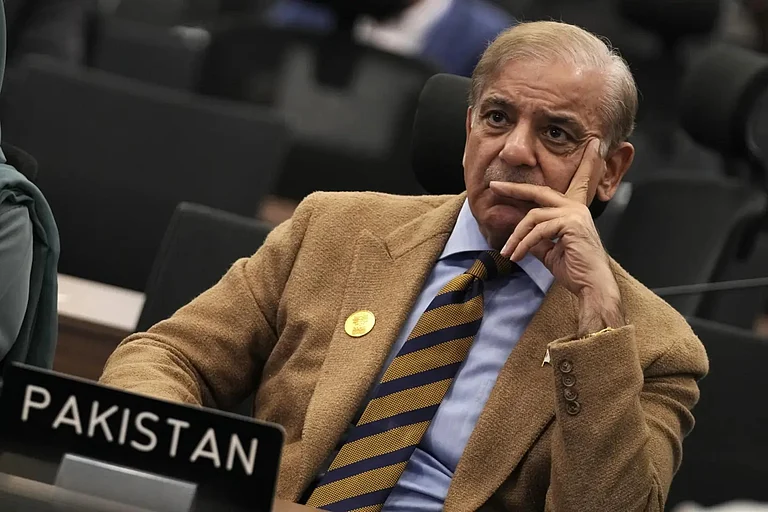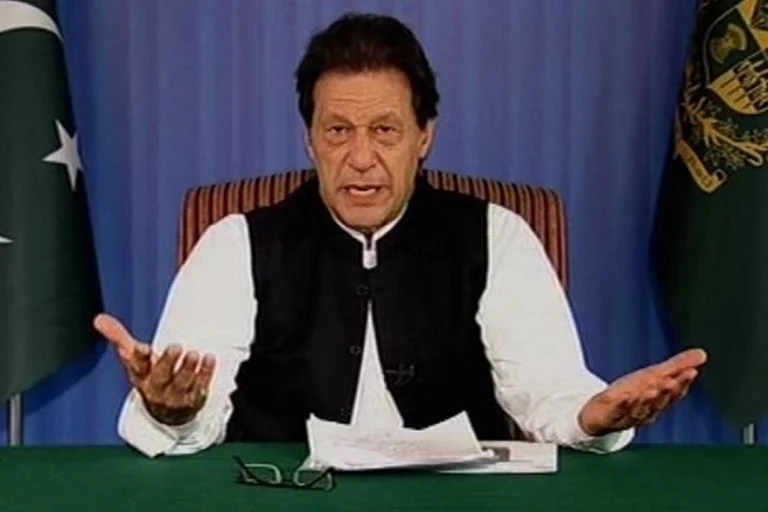After a national election that stumped Pakistan's observers and the country's political elite alike, Shehbaz Sharif is now set to become the Prime Minister of Pakistan despite not having a parliamentary majority of his own.
Shehbaz has tied up his family-run Pakistan Muslim League-Nawaz (PML-N) with the Bhutto-Zardari family's Pakistan Peoples Party (PPP) to form the federal government. While Shehbaz is becoming the Prime Minister, PPP Co-Chairman Asif Ali Zardari will be the candidate for the post of the President of Pakistan.
While political pundits expected the PML-N to win smoothly, the Independent candidates backed by Pakistan Tehreek-i-Insaf (PTI), the party of the jailed former premier Imran Khan, won the most seats. They won a total of 93 of 266 contestable seats, followed by PML-N's 75, PPP's 54, Muttahida Qaumi Movement's (MQM) 17. The results were delayed and there have been widespread allegations of rigging as it has been an open secret that the all-powerful military of the country favoured the PML-N over Imran, who had been openly campaigning against the military for two years.
The announcement of Shehbaz, however, as the PM-designate came as a surprise. It was widely expected that his older brother, the three-time PM Nawaz Sharif, will become the PM of Pakistan. While Shehbaz is a veteran politician who has held multiple chief ministerial terms, he has only been prime minister once and has been in the shadows of his older brother for much of his public life.
Here we trace the life and politics of Shehbaz Sharif, his record as the prime minister, and why he has become the Prime Minister of Pakistan now.
Why Has Shehbaz Sharif Become PM Of Pakistan?
Shehbaz Sharif, 72, was not the most obvious person to be the Prime Minister of Pakistan. That was Nawaz Sharif, his older brother and the patriarch of the Pakistan Muslim League-Nawaz (PML-N). The circumstances, however, brought Shehbaz to the fore.
Firstly, it is understood that Nawaz did not want to lead a coalition government. As the PML-N performed worse-than-expected and failed to get a majority on its own, it is coming to power in an alliance with the Pakistan Peoples Party (PPP) of the Bhutto-Zardari family. This was confirmed by Maryam, Nawaz's daughter and a senior PML-N leader who is widely seen as Nawaz's political heir.
"Nawaz Sharif wanted to become PM for a fourth time but after the split mandate, he withdrew from the top slot…Those who know Nawaz are also aware that he is not interested in leading a coalition government. There is no truth in the inference that Nawaz has decided to quit politics. He will supervise the federal and Punjab governments and play his due role…Shehbaz and I are his soldiers, bound to follow his command," said Maryam, as per The Indian Express.
Secondly, among the Sharif siblings, Shehbaz is more preferred by Pakistan's all-powerful military. While Nawaz has a history of having run-ins with the military, Shehbaz has been much more pragmatic and is known to be on good terms with the country's generals. While Imran has now emerged as the staunchest critic of the Pakistani military and has railed against the establishment with unprecedented ferocity and popular support, Nawaz too had mounted an opposition against the military briefly after being ousted in 2017 as the PM of Pakistan in legal troubles fuelled by the military's distaste for him.
The Life And Political Career Of Shehbaz Sharif
Shehbaz Sharif belongs to the Sharif political dynasty of Pakistan. Before entering politics, the family was one of the leading business families of Pakistan's Punjab province, the most powerful state in the country from where the bulk of the political and military leadership of the country comes.
Shehbaz was born on September 23, 1951, in Lahore. He is two years junior to Nawaz Sharif, the three-time former Prime Minister of Pakistan. They belong to a Punjabi-speaking family of Kashmiri descent. Their family-run business, the steel business of Ittefaq Group, was started by their father Muhammad Sharif.
Shehbaz joined the family business in the 1970s. The family's factories were nationalised under the government of former Prime Minister Zulfikar Ali Bhutto in 1974 but were restored to the private ownership of the family in 1977 after Bhutto was ousted in a military coup by then Army chief General Zia-ul-Haq. Sometime after this, Nawaz began to be mentored by Ghulam Jilani Khan, a top Pakistani Army commander who helped set up the Pakistan Muslim League-Nawaz (PML-N) and launch the political career of Nawaz.
In 1988, Shehbaz was elected to the Punjab assembly. Earlier, his brother Nawaz had become the CM of Punjab in 1985.
In 1990, Shehbaz was elected to the National Assembly (NA). In 1993, he was re-elected to both the NA and the Punjab assembly. He gave up the NA seat to become the Leader of Opposition in the Punjab assembly (1993-96).
In 1997, PML-N under Shehbaz won the Punjab elections and he became the Chief Minister of Punjab. At the same time, Nawaz was the Prime Minister of Pakistan.
In 1999, however, the then-Pakistan Army chief General Parvez Musharaff toppled Nawaz's government to set up military rule, which also led to the fall of Shehbaz's provincial government. In 2000, the Sharif brothers had to go into exile and they only returned to the country in 2007. While the Sharifs were absent from the country, they returned to power soon after their return to the country.
In 2008, Shehbaz-led PML-N won the provincial elections in Punjab and he became the CM. He again became the CM of Punjab in 2013 and served the full term till 2018. In 2013, Nawaz became the PM of Pakistan. As the CM of Punjab, Shehbaz earned a reputation as an able administrator.
"He earned a reputation as an able administrator, taking on development projects, improving access to education, and rooting out corruption in bureaucracy. He remained chief minister after the 2013 elections left his party in charge, and he continued his development program into his second term. Among his most notable projects in his second term was the construction of the Orange Line metro train system in Lahore, the first of its kind in Pakistan. Such projects were made possible through increased investment from China, whose China-Pakistan Economic Corridor (CPEC) program had made Pakistan the strategic centre of China’s Belt and Road Initiative (BRI) during Sharif’s tenure as chief minister," notes The Britannica Encyclopaedia.
In 2018, after Nawaz was ousted as the PM of Pakistan, Shehbaz switched to the federal politics and became the Leader of Opposition in NA. He held the position until 2022 when he became the Prime Minister of Pakistan after Imran Khan lost his seat in a trust vote.
Shehbaz Sharif's Record As PM
As the Prime Minister of Pakistan, Shehbaz Sharif reversed the populist-Islamist and anti-Western politics of Imran Khan of PTI. Towards the end of his tenure, Imran had mounted a populist platform where he claimed that a US-sponsored foreign conspiracy, of which Shehbaz and other opponents were also part of, was working to remove him as the PM of Pakistan.
Shehbaz's tenure also saw him negotiate succesfully with the International Monetary Fund (IMF) and improve relations with China. He also worked on the relations with the United States which had nosedived under Imran. Fresh negotiations are slated to be held again and that would test him again.
Shehbaz's tenure also saw increased attacks by the Tehreeek-i-Taliban Pakistan (TTP) that killed hundreds in a wave of attacks. But as the security and foreign policy in Pakistan remain the domain of the all-powerful military establishment, the criticism was also directed at the military instead of Shehbaz, who was anyway understood to be a man from the King's Party.
As for the future, Shehbaz has become Prime Minister of Pakistan at a time when he and his party are seen as the military's choice and the election result's credibility is widely questioned. The military's image too has been dented and Imran's anti-army plank has found popular support. Notably, Shehbaz does not lead the most successful party. As a prime minister of the party that lost the elections and as a man of the army that stands unprecedently unpopular, the road may not be as smooth for him as the last time. But the fact remains that he is the Prime Minister of Pakistan.
As Siddharth Singh noted in Open magazine the first time Shehbaz became the premier: "A politically inopportune time for the army is a politically convenient one for Shehbaz. In this, the two Sharifs are like cheese and chalk: the elder one is known for his bruising encounters with the men in khaki; the younger one just wants to mind his business."
The army is known to bounce back in Pakistan. Shehbaz would be counting on it.


























